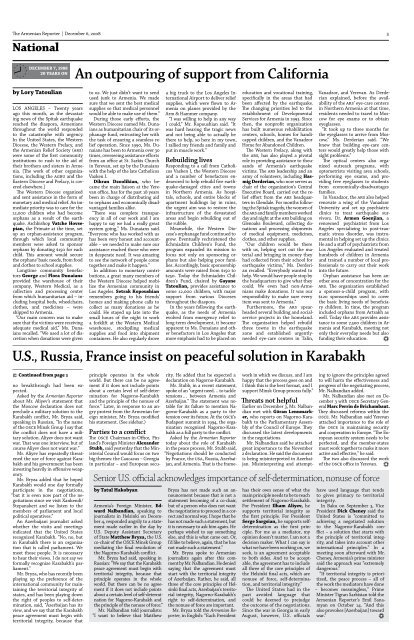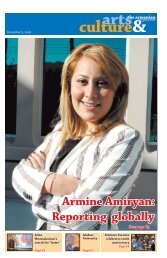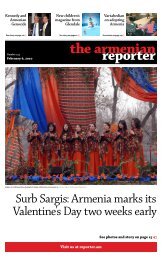National, International, Armenia, and Community News and Opinion
National, International, Armenia, and Community News and Opinion
National, International, Armenia, and Community News and Opinion
Create successful ePaper yourself
Turn your PDF publications into a flip-book with our unique Google optimized e-Paper software.
The <strong>Armenia</strong>n Reporter | December 6, 2008<strong>National</strong>December 7, 198820 years onAn outpouring of support from Californiaby Lory TatoulianLOS ANGELES – Twenty yearsago this month, as the devastatingnews of the Spitak earthquakereached the diaspora, <strong>Armenia</strong>nsthroughout the world respondedto the catastrophe with urgency.In the United States, the WesternDiocese, the Western Prelacy, <strong>and</strong>the <strong>Armenia</strong>n Relief Society (ARS)were some of the first communityinstitutions to rush to the aid oftheir brothers <strong>and</strong> sisters in <strong>Armenia</strong>.[The work of other organizations,including the AGBU <strong>and</strong> theEastern Diocese <strong>and</strong> Prelacy, is coveredelsewhere.]The Western Diocese organized<strong>and</strong> sent assistance in the form ofmonetary <strong>and</strong> medical relief. An immediatepriority was to care for the12,000 children who had becomeorphans as a result of the earthquake.Archbishop Vatche Hovsepian,the Primate at the time, setup an orphan-assistance program,through which local communitymembers were asked to sponsororphans by donating $150 for eachchild. This amount would securethe orphans’ basic needs, from food<strong>and</strong> clothes to school supplies.Longtime community benefactorsGeorge <strong>and</strong> Flora Dunaiansprovided the warehouse of theircompany, Western Medical, as acollection <strong>and</strong> processing centerfrom which humanitarian aid – includinghospital beds, wheelchairs,clothes, <strong>and</strong> medicines – wereshipped to <strong>Armenia</strong>.“Our main concern was to makesure that the victims were receivingadequate medical aid,” Ms. Dunaiansrecalled. “We used a lot of discretionwhen donations were givento us. We just didn’t want to sendused junk to <strong>Armenia</strong>. We madesure that we sent the best medicalsupplies so that medical personnelwould be able to make use of them.”During those early efforts, theWestern Diocese named Ms. Dunaiansas humanitarian chair of its orphanagefund, entrusting her withthe task of ensuring a seamless reliefoperation. Since 1990, Ms. Dunaianshas been to <strong>Armenia</strong> over 30times, overseeing assistance effortsfrom an office at St. Sarkis Churchin Yerevan, set up by the Dunaianswith the help of the late CatholicosVazken I.Dikran Dzoolikian, who becamethe main liaison at the Yerevanoffice, has for the past 18 yearsbeen in charge of distributing aidto orphans <strong>and</strong> economically disadvantagedfamilies alike.“There was complete transparencyin all of our work <strong>and</strong> I amhappy to say we had a really greatsystem going,” Ms. Dunaians said.“Everyone who has worked with ushas been very honest <strong>and</strong> accountable– we needed to make sure ourassistance reached those who werein desperate need. It was amazingto see the network of people cometogether <strong>and</strong> make it happen.”In addition to monetary contributions,a great many members ofthe Western Diocese helped mobilizethe <strong>Armenia</strong>n community inLos Angeles. Setrak Kopoushianremembers going to his friends’homes <strong>and</strong> making phone calls tocollect as many donations as hecould. He stayed up late into thesmall hours of the night to worka forklift at the Western Medicalwarehouse, stockpiling medicalsupplies <strong>and</strong> food into shipmentcontainers. He also regularly drovea big truck to the Los Angeles <strong>International</strong>Airport to deliver reliefsupplies, which were flown to <strong>Armenia</strong>on planes provided by theArm & Hammer company.“I was willing to help in any wayI could,” Mr. Kopoushian said. “Itwas hard hearing the tragic news<strong>and</strong> not being able to actually bethere to help, so here in my town,I rallied my friends <strong>and</strong> family <strong>and</strong>put in muscle work.”Rebuilding livesResponding to a call from CatholicosVazken I, the Western Diocese<strong>and</strong> a number of benefactors endeavoredto help rebuild five earthquake-damagedcities <strong>and</strong> townsin Northern <strong>Armenia</strong>. As hospitals,schools, <strong>and</strong> entire blocks ofapartment buildings lay in ruins,the urgent aim was to restore theinfrastructure of the devastatedareas <strong>and</strong> begin rebuilding out ofthe rubble.Meanwhile, the Western Diocese’sorphanage fund continued togrow. Eventually rechristened theEchmiadzin Children’s Fund, theprogram exp<strong>and</strong>ed its mission tofocus not only on sponsoring orphansbut also helping poor families.Accordingly, basic sponsorshipamounts were raised from $150 to$250. Today the Echmiadzin Children’sFund, chaired by GayaneTatoulian, provides assistance tosome 12,000 children, with majorsupport from various Diocesesthroughout the diaspora.In the years following the earthquake,as the needs of <strong>Armenia</strong>evolved from emergency relief tolong-term development, it becameapparent to Ms. Dunaians <strong>and</strong> otherbenefactors in Los Angeles thatmore emphasis had to be placed oneducation <strong>and</strong> vocational training,specifically in the areas that hadbeen affected by the earthquake.The changing priorities led to theestablishment of DevelopmentalServices for <strong>Armenia</strong> in 1993. Sincethen, the nonprofit organizationhas built numerous rehabilitationcenters, schools, homes for h<strong>and</strong>icappedchildren, <strong>and</strong> the VanadzorHome for Ab<strong>and</strong>oned Children.The Western Prelacy, along withthe ARS, has also played a pivotalrole in providing assistance to thous<strong>and</strong>sof <strong>Armenia</strong>’s earthquakevictims. The ARS leadership <strong>and</strong> anarmy of volunteers, including HasmigDerderian, who now serves aschair of the organization’s CentralExecutive Board, carried out the reliefeffort from the ARS headquartersin Glendale. For months followingthe Spitak tragedy, the women ofthe ARS <strong>and</strong> family members workedday <strong>and</strong> night at the ARS building onGlenoaks Boulevard, collecting donations<strong>and</strong> processing shipmentsof medical equipment, medicines,clothes, <strong>and</strong> other supplies.“Our children would be therewith us, helping sort out the material<strong>and</strong> bringing in money theyhad collected from their school forearthquake victims,” Ms. Derderianrecalled. “Everybody wanted tohelp. We would have people stop bythe headquarters to give what theycould. We even had non-<strong>Armenia</strong>nsmake donations. It was ourresponsibility to make sure everyitem was sent to <strong>Armenia</strong>.”Furthermore, the ARS spearheadedseveral building <strong>and</strong> socialserviceprojects in the homel<strong>and</strong>.The organization helped rebuildthree towns in the earthquakezone <strong>and</strong> established urgentlyneededeye-care centers in Talin,Vanadzor, <strong>and</strong> Yerevan. As Derderianexplained, before the availabilityof the ARS’ eye-care centersin Northern <strong>Armenia</strong> at that time,residents needed to travel to Moscowfor eye exams or to obtaineyeglasses.“It took up to three months forthe eyeglasses to arrive from Moscow,”Ms. Derderian said. “Weknew that building eye-care centerswould greatly help those withsight problems.”The optical centers also organizedoutreach programs, withoptometrists visiting area schools,performing eye exams, <strong>and</strong> providingfree eyeglasses to studentsfrom economically-disadvantagesfamilies.In Vanadzor, the ARS also helpedrenovate a wing of the VanadzorUniversity <strong>and</strong> set up psychiatricclinics to treat earthquake survivors.Dr. Armen Goenjian, arenowned psychiatrist from LosAngeles specializing in post-traumaticstress disorder, was instrumentalin helping set up the clinics.He <strong>and</strong> a staff of psychiatrists fromLos Angeles evaluated <strong>and</strong> treatedhundreds of children in <strong>Armenia</strong><strong>and</strong> trained a number of local professionalsto carry out their workinto the future.Orphan assistance has been anotherarea of concentration for theARS. The organization establisheda sponsor-a-child program, with$120 sponsorships used to coverthe basic living needs of beneficiarychildren. In time, the programincluded orphans from Artsakh aswell. Today the ARS provides assistanceto some 7,500 children in <strong>Armenia</strong><strong>and</strong> Karabakh, meeting notonly their everyday needs but alsofunding their education. fU.S., Russia, France insist on peaceful solution in Karabakhn Continued from page no breakthrough had been expected.Asked by the <strong>Armenia</strong>n Reporterabout Mr. Aliyev’s statement thatthe Moscow declaration does notpreclude a military solution to theKarabakh conflict, Mr. Bryza said,speaking in Russian, “In the nameof the OSCE Minsk Group I say thatthe conflict does not have a militarysolution. Aliyev does not wantwar. That was one interview, but ofcourse Aliyev does not want war.”Mr. Aliyev has repeatedly threatenedthe use of force against Karabakh<strong>and</strong> his government has beeninvesting heavily in offensive weaponry.Mr. Bryza added that he hopedKarabakh would one day formallyparticipate in the negotiations,“but it is even now part of the negotiationssince we visit Xankendi/Stepanakert <strong>and</strong> we listen to themembers of parliament <strong>and</strong> localpolitical operatives.”An Azerbaijani journalist askedwhether the visits <strong>and</strong> meetingsindicated that the United Statesrecognized Karabakh. “No, no, butin Karabakh there is an organizationthat is called parliament. Wemeet those people. It is necessaryto hear their views. I do not say weformally recognize Karabakh’s parliament.”Mr. Bryza, who has recently beenplaying up the preference of theinternational community for maintainingthe territorial integrity ofstates, <strong>and</strong> has been playing downthe right of peoples to self-determination,said, “Azerbaijan has itsview, <strong>and</strong> we say that the Karabakhpeace agreement must begin withterritorial integrity, because thatprinciple operates in the wholeworld. But there can be no agreementif it does not include pointsabout a certain level of self-determinationfor Nagorno-Karabakh<strong>and</strong> the principle of the nonuse offorce.” Later, in response to an angryprotest from the <strong>Armenia</strong>n foreignminister, Mr. Bryza modifiedhis statement. (See sidebar.)by Tatul Hakobyan<strong>Armenia</strong>’s Foreign Minister, EdwardNalb<strong>and</strong>ian, speaking tojournalists in Helsinki on December4, responded angrily to a statementmade earlier in the day byU.S. Deputy Assistant Secretaryof State Matthew Bryza, the U.S.co-chair of the OSCE Minsk Groupmediating the final resolution ofthe Nagorno-Karabakh conflict.Mr. Bryza had said, speaking inRussian: “We say that the Karabakhpeace agreement must begin withterritorial integrity, because thatprinciple operates in the wholeworld. But there can be no agreementif it does not include pointsabout a certain level of self-determinationfor Nagorno-Karabakh <strong>and</strong>the principle of the nonuse of force.”Mr. Nalb<strong>and</strong>ian told journalists:“I want to believe that MatthewBryza has not made such an announcementbecause that is not astatement becoming of a co-chair,but of a person who does not wantthe negotiations to proceed in a correct<strong>and</strong> normal way. I hope that hehas not made such a statement, butit is necessary to ask him again. Heperhaps wished to say somethingelse, <strong>and</strong> this is what came out. Or,I’d like to believe, again, that he hasnot made such a statement.”Mr. Bryza spoke to <strong>Armenia</strong>njournalists again after this commentby Mr. Nalb<strong>and</strong>ian. He deniedsaying that the agreement muststart with the territorial integrityof Azerbaijan. Rather, he said, allthree of the core principles of Helsinkifinal acts, Azerbaijan’s territorialintegrity, Nagorno-Karabakh’sright to self-determination, <strong>and</strong>the nonuse of force are important.Mr. Bryza told the <strong>Armenia</strong>n Reporter,in English: “Each PresidentParties to a conflictThe OSCE Chairman-in-Office, Finl<strong>and</strong>’sForeign Minister Alex<strong>and</strong>erStubb, said yesterday that the MinisterialCouncil would focus on twobig themes: the Caucasus – Georgiain particular – <strong>and</strong> European security.He added that he expected adeclaration on Nagorno-Karabakh.Mr. Stubb, in a recent statement,spoke of an “urgent need . . . to tackletensions . . . between <strong>Armenia</strong> <strong>and</strong>Azerbaijan.” The statement was notablefor its failure to mention Nagorno-Karabakhas a party to thetension over its future. At the OSCE’sBudapest summit in 1994, the organizationrecognized Nagorno-Karabakhas a full party to the conflict.Asked by the <strong>Armenia</strong>n Reportertoday about the role of Karabakhin the peace process, Mr. Stubb said,“Negotiations should be conductedby France, the USA, Russia, Azerbaijan,<strong>and</strong> <strong>Armenia</strong>. That is the frameworkin which we discuss, <strong>and</strong> I amhappy that the process goes on <strong>and</strong>I think this is the best format, <strong>and</strong> Isupport Minsk Group process fully.”has their own sense of what themain principle needs to be to reachsettlement of Nagorno-Karabakh.For President Ilham Aliyev, hesupports territorial integrity asthe first principle. For PresidentSerge Sargsian, he supports selfdeterminationas the first principle.For me as a mediator, myopinion doesn’t matter. I am not adecision maker. What I can say iswhat we have been working on, weseek, is an agreement acceptableto both sides. And to be acceptable,the agreement has to includeall three of the core principles ofthe Helsinki final acts, which arenonuse of force, self-determination,<strong>and</strong> territorial integrity.”The United States had in thepast avoided language thatcould be deemed to prejudgethe outcome of the negotiations.Since the war in Georgia in earlyAugust, however, U.S. officialsThreats not helpfulEarlier on December 3, Mr. Nalb<strong>and</strong>ianmet with Göran Lennmarker,who reports on Nagorno-Karabakhto the Parliamentary Assemblyof the Council of Europe. Theydiscussed the latest developmentsin the negotiations.Mr. Nalb<strong>and</strong>ian said he attachedgreat importance to the November2 declaration. He said the documentis being misinterpreted in Azerbaijan.Misinterpreting <strong>and</strong> attemptingto ignore the principles agreedto will harm the effectiveness <strong>and</strong>progress of the negotiating process,Mr. Nalb<strong>and</strong>ian added.Mr. Nalb<strong>and</strong>ian also met on December3 with OSCE Secretary GeneralMarc Perrin de Brichambaut.They discussed reforms within theOSCE. Mr. Nalb<strong>and</strong>ian said Yerevanattached importance to the role ofthe OSCE in maintaining security<strong>and</strong> cooperation in Europe. “The Europeansecurity system needs to beperfected, <strong>and</strong> the member-statesmust work together to make it moreactive <strong>and</strong> effective,” he said.The two also discussed the workof the OSCE office in Yerevan. fSenior U.S. official acknowledges importance of self-determination, nonuse of forcehave used language that tendsto gives primacy to territorialintegrity.In Baku on September 3, VicePresident Dick Cheney said theUnited States is “committed toachieving a negotiated solutionto the Nagorno-Karabakh conflict– a solution that starts withthe principle of territorial integrity,<strong>and</strong> takes into account otherinternational principles.” In ameeting soon afterward with Mr.Cheney, <strong>Armenia</strong>’s prime ministersaid the approach was “extremelydangerous.”“If territorial integrity is prioritized,the peace process – all ofthe work the mediators have done– becomes meaningless,” PrimeMinister Tigran Sarkisian told the<strong>Armenia</strong>n Reporter’s Emil Sanamyanon October 14. “And thisalso provokes [Azerbaijan] towardwar.”f

















